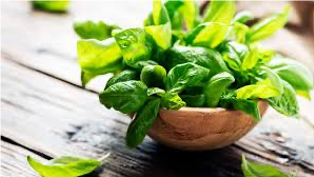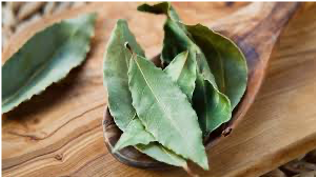Today’s herb is Basil
from our lovely Krissy B, our resident food explorer
 Basil is a flavourful, leafy green herb that originated in Asia and Africa.
Basil is a flavourful, leafy green herb that originated in Asia and Africa.
It’s a member of the mint family, and many different varieties exist.
The many varied species of basil include sweet basil, lemon basil, Italian or curly basil, holy basil, Thai basil and lettuce-leaf basil.
The smell and flavour of basil vary upon the concentration of essential volatile oils present in the herb. Cinnamate, citronellol, geraniol, linalool, pinene and terpineol are some of the oils that one can find across all species of basil. And it is the presence of these oils that chiefly affect the medicinal benefits of basil leaves.
Scientific research is limited but studies suggest that basil has the following benefits:
- can be good for digestion – the eugenol present in the leaves ensures anti-inflammatory action in the digestive tract
- can have anti-inflammatory benefits – the powerful essential oils, including eugenol, citronellol and linalool, help lower inflammation in the body through their enzyme inhibiting properties; also helps restore body’s natural PH level
- can fight free radical activity – basil contains two important water-soluble flavonoid antioxidants, known as orientin and viceninare, these potent antioxidants strengthen immune system, protect cellular structure, DNA and delay effects of skin ageing
- basil’s powerful oil helps cleanse the skin from within – it also helps remove dirt and impurities that clog pores
BEAUTY TIP – perfect for those stay at home days
Make a paste of basil leaves, sandalwood paste and rose water. Apply the paste on your face and let it sit for 20 minutes. Was it off with cold water. The strong anti-inflammatory and antimicrobial properties of basil would help prevent formation of acne
- can help fight depression – basil is believed to stimulate neurotransmitters that regulate the hormones responsible for inducing happiness and energy; basil is considered as a powerful adaptogen or an anti-stress agent and its anti-inflammatory and immune-boosting properties help manage stress too
- can help fight diabetes – consumption of basil could result in slow release of sugar in the blood, which is very essential for diabetics; the herb has very low glycaemic load and the essential oil present in basil also helps cut down triglyceride and cholesterol levels, which is a persistent risk factor amongst diabetics
- can support liver function and help detoxify the body – liver is a very essential organ for the body as it plays a crucial role in metabolism and basil may help prevent fat build-up in the liver and keep your liver healthy
- as it is high in vitamin K, can help blood clots
Basil is safe to take for most people, but the following groups should avoid:
- people with high blood pressure should limit consumption
- people on blood thinner should limit consumption
- ladies who are pregnant or trying to get pregnant
If in doubt, as ever, please seek advice from a healthcare or medical professional.
Basil can be found in fresh or dried herb format or as an oil.
Today’s spice is bay leaf
 Bay leaf is from the laurel family, a family of evergreen trees and shrubs most commonly found in parts of Asia and America. It’s different from other laurels because it originates near the Mediterranean.
Bay leaf is from the laurel family, a family of evergreen trees and shrubs most commonly found in parts of Asia and America. It’s different from other laurels because it originates near the Mediterranean.
Bay leaves have been used many different ways throughout history, including as a diuretic or even as a diaphoretic, a substance that promotes sweating.
Scientific research is limited but some studies suggest that bay leaf has the following benefits:
- can help keep cancer at bay – the extract may help kill cancer cells by assisting apoptosis, or programmed cell death; also, Cineole, the main compound in bay leaves, was found to suppress the growth of leukaemia cancer cell lines
- can help lower and manage glucose levels and cholesterol levels in people with diabetes – this is most likely because bay leaves contain polyphenols, which are powerful antioxidants
- can help reduce inflammation and aid wound healing
- may reduce food cravings so can help contribute to weight management
- may contribute to treatment of respiratory issues
- can help combat stress and anxiety
HEALTH TIP – burn dried bay leaves to create a relaxing atmosphere in your home during these uncertain times
Bay leaf is safe to take for most people, but the following groups should avoid:
- people on blood sugar medication
- pregnant and breast-feeding ladies
If in doubt, as ever, please seek advice from a healthcare or medical professional.
Bay leaves can be found in fresh or dried herb format mostly.
